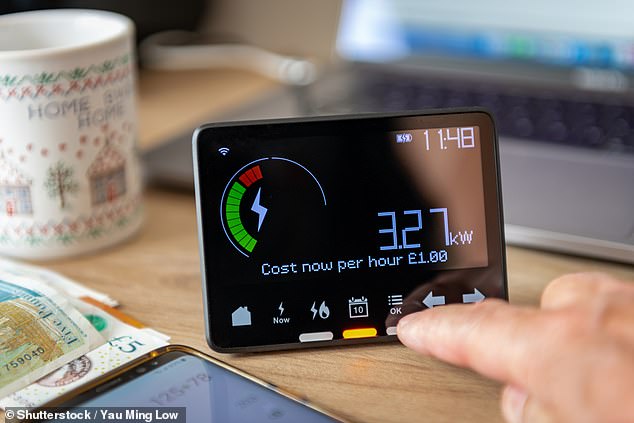Households will receive automatic compensation for faulty smart meters and long wait times for repair under new rules proposed by the regulator.
Ofgem has said energy suppliers must comply with its smart meter rules or have to pay out to households and microbusinesses.
This will include customers who have to wait more than six weeks for an installation, or if a failed smart meter installation is due to something within a supplier’s control.
Suppliers will also need to provide a ‘resolution’ plan within five working days of a report of a faulty meter.
Any meters not running in ‘smart mode’ – which send automatic readings to a supplier – will need to be fixed within 90 days.

Pay up: Ofgem will make energy suppliers pay automatic compensation for faulty meters
The current rules stipulate that an automatic payment of £40 has to be made to consumers if they fail to meet the minimum standards.
Charlotte Friel, director of retail pricing and systems at Ofgem said: ‘We know many customers that want a smart meter wait too long to get one installed or face delays on repairs when it stops working – this needs to change.
‘We’re working closely with suppliers to drive improvement, and have seen more than 600,000 faulty smart meters reconnected since last July after we opened compliance engagement.
‘This is only the beginning – with automatic compensation, faster fixes, and improved installation standards well on the way, getting a smart meter will be quicker and easier than ever.’
Last year, Ofgem opened what it calls ‘compliance engagement’ with the six biggest suppliers for not meeting installation targets and meters not operating in smart mode.
Two-thirds of homes in Britain have a smart meter, with more than 90 per cent working correctly, according to Ofgem.
However, they are unlikely to meet the government target of installing the gadgets in 80 per cent of households by the end of this year.
The latest official figures showed 38 million smart meters were in homes and small businesses by the end of 2027, around 66 per cent.
Installation has also slowed, with 3 million meters installed last year, representing a 15 per cent fall from 2023.
Smart meters are not compulsory and households are within their right to refuse, but they risk not having access to all energy tariffs.
Some suppliers insist that the traditional meters are nearing the end of their life and will cease to work to convince households to move to smart meters.
Approximately 6 per cent of households have had the meters installed but turned on ‘dumb mode’, which means they do not send readings to suppliers.
#Households #receive #automatic #compensation #faulty #smart #meters #long #repair #times #Ofgem
















